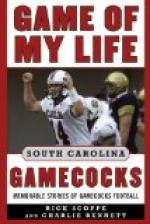During the time we spent in Fort Sumter we had not seen a clear day or night. In harmony with the continual danger by which we were surrounded, the very atmosphere wore the pall of death; for it was always rainy and cloudy. The mutilated bodies of the negroes, mingled with the black mud and water in the fort yard, added to the awfulness of the scene. Pieces of bombshells and other pieces of iron, and also large southern pine timbers were scattered all over the yard of the fort. There was also a little lime house in the middle of the yard, into which we were warned not to go when seeking places of safety from the deadly missiles at the cry of the sentinel.
The orders were that we should get as near the centre of the fort yard as possible and lie down. The reason for this was that the shells which were fired upon Sumter were so measured that they would burst in the air, and the pieces would generally fly toward the sides of the fort. But the orders were not strictly carried out, because, at the warning cries of the sentinel, we became confused. That night, at the cry of the sentinel, I ran and lay down on one of the large southern pine timbers, and several of my fellow negroes followed and piled in upon me. Their weight was so heavy that I cried out as for life. The sense of that crush I feel at certain times even now.
At the next report of a shell I ran toward the lime house, but some one tripped me up, and, by the time I had got to my feet again, twelve or thirteen others were crowded into it. Another negro and I reached the doorway, but we were not more than there before a mortar shell came crushing down upon the little lime house, and all within were so mangled that their bodies were not recognizable.
Only we two were saved. My companion had one of his legs broken, and a piece of shell had wounded me over my right eye and cut open my under lip. At the moment I was wounded I was not unconscious, but I did not know what had hurt me. I became almost blind from the effect of my wounds, but not directly after I was wounded, and I felt no pain for a day or so. With other wounded I was taken to the bombproof in the fort. I shall never forget this first and last visit to the hospital department. To witness the rough handling of the wounded patients, to see them thrown on a table as one would a piece of beef, and to see the doctor use his knife and saw, cutting off a leg, or arm, and sometimes both, with as much indifference as if he were simply cutting up beef, and to hear the doctor say, of almost every other one of these victims, after a leg or an arm was amputated, “Put that fellow in his box,” meaning his coffin, was an awful experience. After the surgeon had asked to whom I belonged, he dressed my wounds.
My readers will remember that I stated that no big boat could run to Fort Sumter at that time, on account of the bombardment. We had to be conveyed back to John’s Island wharf in rowboats, which was the nearest distance a steamer could go to Fort Sumter.




